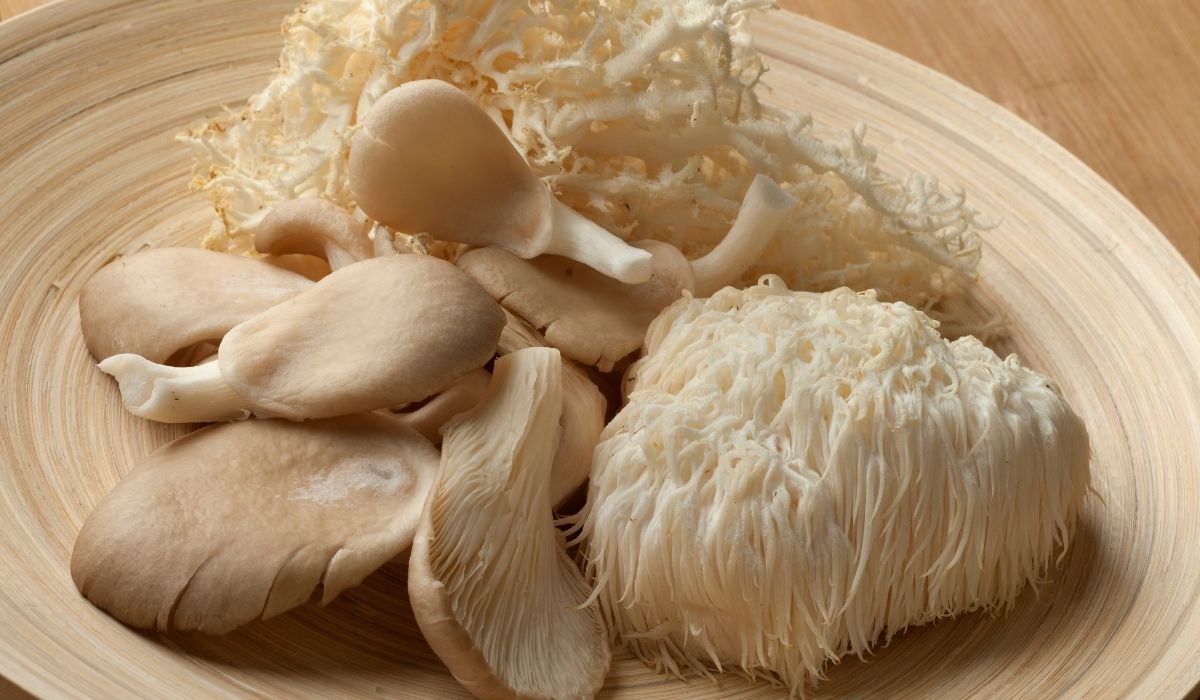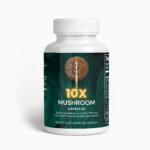
“Neuroscience Loves Lion’s Mane: Here’s Why You Should Too”
If you’re a fan of natural supplements, you’ve probably heard about Lion’s Mane. This medicinal mushroom has been gaining popularity in recent years, and for good reason. Researchers in the field of neuroscience are particularly excited about Lion’s Mane for its potential to support brain health and cognitive function. In this article, we’ll explore the scientific evidence behind this fascinating fungi and explain why everyone should consider adding it to their supplement regimen.
1. Introduction to Lion’s Mane and its Benefits
Lion’s Mane mushroom is one of the most popular medicinal mushrooms due to its impressive health benefits. Given its unique appearance, resembling a lion’s mane hence its name, it is primarily found in North America, Europe, and Asia. It is easily distinguishable, with long, flowing tendrils and a snow-white color.
One of the main benefits of eating Lion’s Mane is its potency as a brain booster. Studies have found that it can help enhance cognitive function, improve memory, and alleviate symptoms of anxiety and depression. This fungus has also been found to boost the production of an essential ingredient for brain health called Nerve Growth Factor (NGF).
Furthermore, Lion’s Mane mushroom has been shown to have anti-inflammatory effects. Research has found that it may reduce inflammation in the body and help improve immunity. It has also been found to decrease the risk of obesity and promote gut health. Regular consumption of Lion’s Mane may contribute to a healthier lifestyle and increased well-being.
2. The Science behind How Lion’s Mane Affects the Brain
Research shows that Lion’s mane mushroom, scientifically known as Hericium erinaceus, is a remarkable fungus that alters the brain’s neural pathways positively. It has been used in Traditional Chinese medicine for centuries to enhance brain functions primarily related to memory, focus, and cognition.
A 2013 clinical study conducted by multiple researchers revealed that Lion’s mane extract could stimulate the production of Nerve Growth Factor (NGF). This protein assists in the growth, maintenance, and survival of nerve cells, which are crucial for the enhancement of cognitive functions. Besides, NGF promotes the regeneration of myelin sheaths, protecting the nerve cells from damage, and improving the transmission of signals between them.
Another study conducted in 2019 discovered that Lion’s mane could also reduce the effects of beta-amyloid plaques, which cause brain inflammation and damage to memory and cognitive decline. Lion’s mane has anti-inflammatory and antioxidant properties that reduce the accumulation of beta-amyloid plaques, thereby mitigating their effects on brain cells.

3. The Role of Lion’s Mane in Enhancing Memory and Improving Focus
One trending topic in the field of nootropics is the potential of Lion’s Mane for enhancing memory and improving focus. Lion’s Mane is a medicinal mushroom that contains various bioactive compounds that can positively affect our cognitive function. Here are some ways Lion’s Mane may benefit your mental performance:
- Enhancing Memory: Lion’s Mane contains compounds called Hericenones and Erinacines, which can stimulate the growth of nerve cells and increase the production of nerve growth factor (NGF) in the brain. NGF is a protein that plays a crucial role in the growth, maintenance, and survival of nerve cells. By increasing the level of NGF, Lion’s Mane can promote the formation of new memories and improve overall cognitive function.
- Boosting Focus: Lion’s Mane can also improve focus and alertness by increasing the levels of acetylcholine in the brain. Acetylcholine is a neurotransmitter that plays a vital role in learning, memory, and attention. By increasing acetylcholine levels, Lion’s Mane can enhance our ability to concentrate and stay focused on tasks.
- Reducing Brain Fog: Brain fog is the feeling of being mentally tired, unfocused, and having difficulty remembering things. Lion’s Mane can help reduce brain fog by increasing the level of oxygen and nutrients in the brain. It can also reduce inflammation, which is a common cause of cognitive decline and brain fog. Overall, Lion’s Mane may improve mental clarity and help you feel more energized and focused throughout the day.
In conclusion, Lion’s Mane may be a useful tool in enhancing memory and improving focus. Its ability to promote the growth of nerve cells and increase the production of NGF and acetylcholine may result in improved cognitive function. Furthermore, Lion’s Mane’s ability to reduce brain fog may also result in heightened mental clarity and concentration. Consider adding Lion’s Mane to your daily regimen to boost your cognitive performance.
4. Lion’s Mane’s Antioxidant Properties and Its Impact on Brain Health
Lion’s Mane mushrooms are loaded with antioxidants, which have numerous benefits for brain health. Antioxidants are compounds that protect cells from damage caused by harmful molecules called free radicals. Free radicals are produced naturally in the body, but environmental factors such as pollution and stress can increase their production beyond what the body can handle. This leads to oxidative stress, which has been linked to numerous diseases, including Alzheimer’s, Parkinson’s, and Huntington’s disease.
The antioxidants in Lion’s Mane mushrooms help protect the brain from oxidative stress. They also promote the growth of brain cells and protect them from damage. Studies have found that Lion’s Mane mushrooms can improve cognitive function, including memory and concentration. They have also been shown to decrease inflammation in the brain. Inflammation is a major contributor to many brain diseases, so reducing it can have significant benefits.
In addition to its antioxidant properties, Lion’s Mane mushrooms have other brain-boosting effects. They contain compounds called polysaccharides, which are believed to stimulate the growth of nerve cells. They also have neuroprotective properties, meaning they protect the brain from damage. Studies have shown that Lion’s Mane mushrooms can improve overall brain function and may even have potential as a treatment for certain neurological disorders.
- The antioxidants in Lion’s Mane mushrooms protect the brain from oxidative stress.
- Lion’s Mane mushrooms promote the growth of brain cells and protect them from damage.
- Lion’s Mane mushrooms have anti-inflammatory properties, which can help prevent brain diseases.
- Polysaccharides in Lion’s Mane mushrooms stimulate the growth of nerve cells.
- Lion’s Mane mushrooms have neuroprotective properties, meaning they protect the brain from damage.
The evidence for the benefits of Lion’s Mane mushrooms on brain health is compelling. If you’re looking for a natural way to boost cognitive function and protect your brain from disease, Lion’s Mane mushrooms are an excellent choice.
5. Lion’s Mane and Its Ability to Stimulate NGF Production in the Brain
Lion’s Mane is a unique mushroom that has been used in Chinese traditional medicine for centuries. Recent studies have shown that it has the ability to stimulate NGF (nerve growth factor) production in the brain, which is responsible for the growth, maintenance, and repair of neurons.
NGF is crucial for maintaining cognitive function and is often deficient in people with neurodegenerative diseases such as Alzheimer’s and Parkinson’s. Studies have shown that Lion’s Mane can help protect against cognitive decline and even improve memory and concentration. It does this by increasing the production of NGF in the brain, which promotes the growth and repair of neurons.
What makes Lion’s Mane unique is that it is one of the few natural substances that has been shown to increase NGF production in the brain. This makes it a potentially powerful tool for preventing and treating age-related cognitive decline, as well as neurodegenerative diseases. While more research is needed to fully understand its mechanisms of action, Lion’s Mane is a promising area of study for anyone looking to enhance cognitive function and protect their brain health.
6. How to Incorporate Lion’s Mane into Your Daily Diet
Lion’s Mane is a dynamic mushroom with a unique look that bears a striking resemblance to a lion’s mane. It is considered to be one of the most treasured medicinal mushrooms in traditional Chinese medicine for its immune-enhancing and brain-boosting qualities. Thus, if you’re seeking to include it in your daily diet, here are some ideas to get you started:
1. Add Lion’s Mane to Your Morning Smoothie
One convenient way to integrate Lion’s Mane mushroom into your diet is by blending it into your breakfast smoothie. It can be used in its powdered form, which is available in most health food stores. Simply add a tsp to your smoothie and enjoy it as part of your daily routine.
2. Incorporate Lion’s Mane in Stir Fry
Lion’s Mane mushroom can be used in many recipes, including stir fry. It has a satisfying firm, meaty texture that is similar to shellfish, making it a perfect substitute for seafood. Use flavorful vegetables like red bell peppers, onions, and baby bok choy to create a delicious stir fry and complement it with Lion’s Mane.
3. Add Lion’s Mane to Your Tea
Lion’s Mane mushroom tea can be brewed and consumed in hot or cold weather. This tea has a woodsy, earthy flavor that pairs well with a variety of herbal blends. Brewing Lion’s Mane tea with other adaptogenic herbs like ashwagandha, lemon balm, and chamomile will increase the health benefits and provide a relaxing experience.
In conclusion, incorporating Lion’s Mane mushroom in your daily diet is simpler than you would expect. Try adding it to your smoothie, stir fry, or tea for a refreshing and nutritious meal!
7. Conclusion: Why You Should Make Lion’s Mane a Staple in Your Supplement Routine
If you’re looking for a supplement with impressive health benefits, Lion’s Mane should definitely be on your radar. This unique mushroom has been used in traditional medicine for centuries, and modern research has only confirmed its potential.
Lion’s Mane can help support cognitive function by promoting nerve growth and fighting inflammation in the brain. It may also help reduce symptoms of anxiety and depression. Additionally, studies have shown that Lion’s Mane can boost immunity, regulate blood sugar levels, and even potentially help fight cancer.
Incorporating Lion’s Mane into your supplement routine is easy – you can find it in capsule, powder, or extract form. Plus, it’s a great natural alternative to other supplements that may have negative side effects. Give Lion’s Mane a try and see how it can improve your health and wellness.
- Lion’s Mane can promote nerve growth and reduce inflammation in the brain.
- It may help reduce symptoms of anxiety and depression.
- It can boost the immune system, regulate blood sugar levels, and potentially fight cancer.
So why not make Lion’s Mane a staple in your supplement routine? With so many potential benefits and few downsides, it’s clear that this mushroom is worth considering. Whether you’re looking to support your brain function, improve your immune system, or simply boost your overall health, Lion’s Mane is definitely worth trying.
Whether you’re a neuroscience lover or an everyday food enthusiast, lion’s mane is a great choice for both your health and taste buds. It’s a unique and delicious mushroom that offers a variety of health benefits, and sci

























